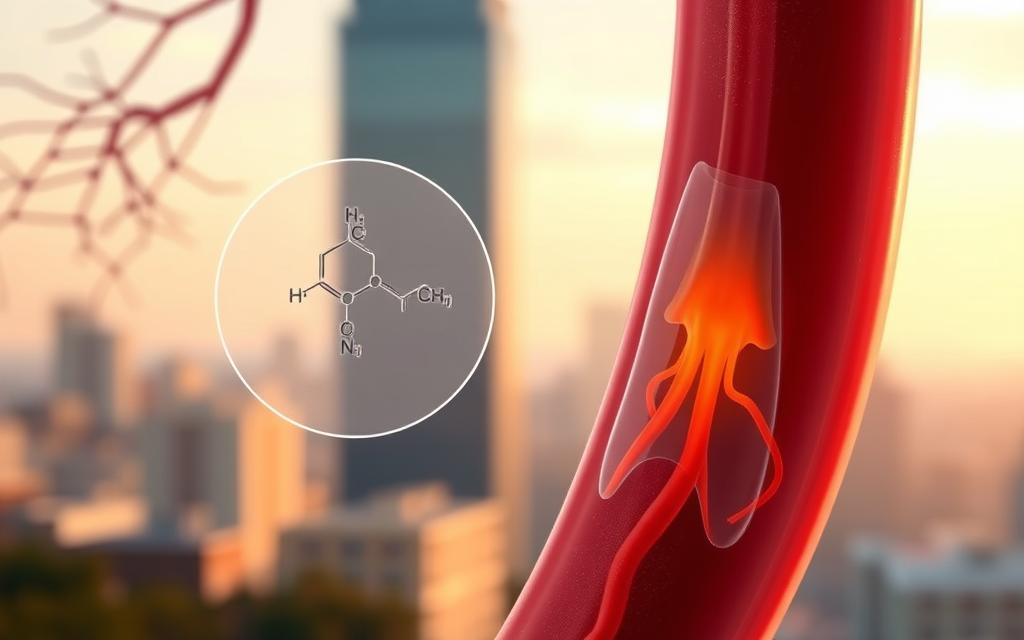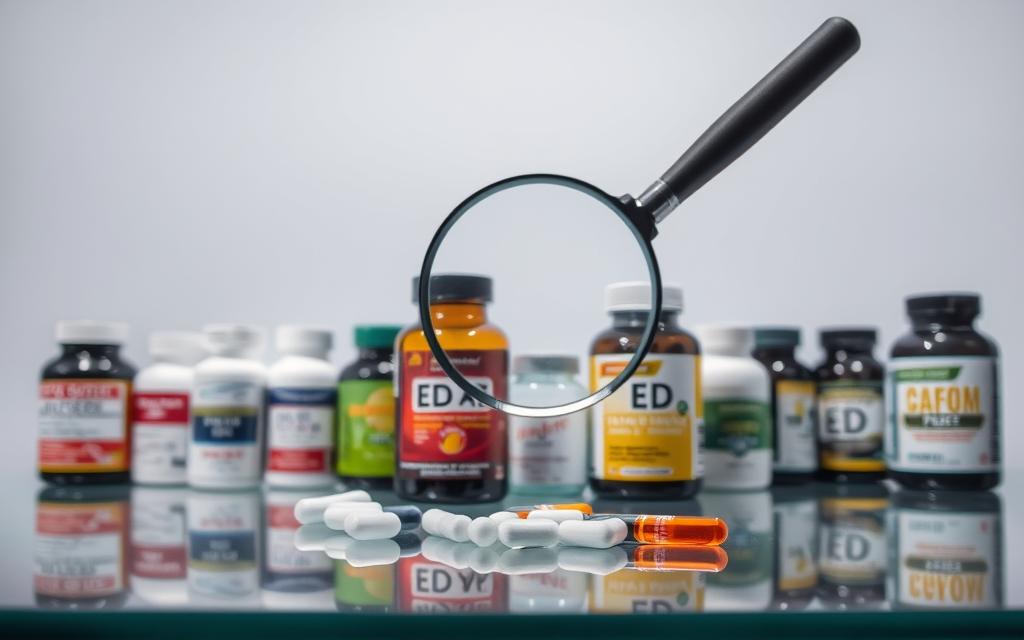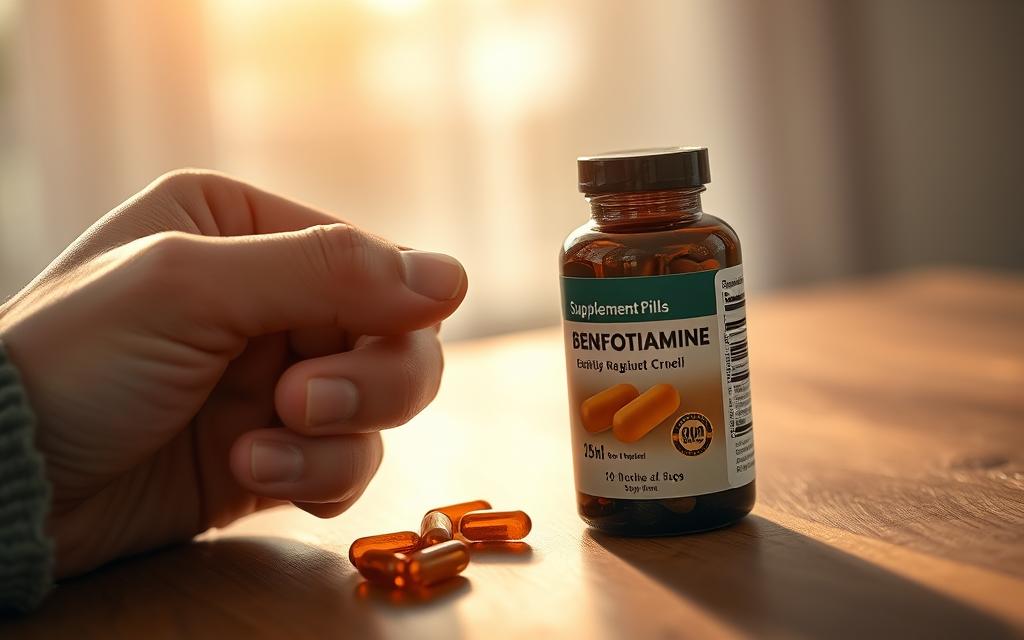Benfotiamine and Erectile Dysfunction: Can This Supplement Improve Sexual Health?
Erectile dysfunction is a common issue affecting millions of men worldwide, impacting their quality of life and relationships. While various treatments are available, there’s growing interest in alternative supplements that can support sexual health. One such supplement is benfotiamine, a derivative of vitamin B1.
Benfotiamine has been studied for its potential benefits in addressing various health concerns, including its possible link to improving erectile function. By exploring the connection between benfotiamine and sexual health, individuals may uncover new avenues for addressing erectile dysfunction.
This article delves into the relationship between benfotiamine and erectile dysfunction, examining the available research and the potential of this supplement to enhance sexual well-being.
Understanding Benfotiamine: A Vitamin B1 Derivative
As a fat-soluble form of thiamine, benfotiamine offers a unique approach to supplementing vitamin B1. Benfotiamine is a derivative that has been designed to overcome the limitations of regular thiamine, particularly in terms of bioavailability.
What Is Benfotiamine?
Benfotiamine is a synthetic, fat-soluble derivative of thiamine (vitamin B1). It is designed to provide higher bioavailability compared to regular thiamine supplements. Benfotiamine benefits include enhanced absorption, which allows it to be more effective in addressing certain health conditions.
The process of creating benfotiamine involves modifying the thiamine molecule to make it more lipophilic, thereby improving its ability to penetrate cell membranes and exert its effects.
How Benfotiamine Differs from Regular Thiamine
The primary difference between benfotiamine and regular thiamine lies in their solubility and bioavailability. Benfotiamine is fat-soluble, whereas thiamine is water-soluble. This difference significantly affects how each compound is absorbed and utilized by the body.
| Characteristics | Benfotiamine | Regular Thiamine |
|---|---|---|
| Solubility | Fat-soluble | Water-soluble |
| Bioavailability | Higher | Lower |
| Absorption | More easily absorbed by cells | Limited cellular absorption |
The Basics of Erectile Dysfunction
Understanding the basics of erectile dysfunction is crucial for exploring its connection to benfotiamine. Erectile dysfunction (ED) is a condition where a man is unable to achieve or maintain an erection sufficient for satisfactory sexual performance.
Erectile dysfunction can result from a variety of factors, including both physical and psychological elements. Common causes include cardiovascular disease, diabetes, obesity, and certain medications. Lifestyle factors such as smoking, excessive alcohol consumption, and lack of physical activity also play a significant role.
Common Causes of ED
The etiology of ED is often multifactorial. Some of the most common causes include:
- Cardiovascular diseases, such as hypertension and atherosclerosis
- Diabetes mellitus, which can damage blood vessels and nerves
- Neurological disorders, including Parkinson’s disease and multiple sclerosis
- Hormonal imbalances, particularly low testosterone levels
- Psychological factors, such as stress, anxiety, and depression
Traditional Treatment Approaches
Traditional treatments for ED often involve a combination of lifestyle modifications, medications, and other interventions. First-line treatments typically include oral phosphodiesterase type 5 (PDE5) inhibitors, such as sildenafil and tadalafil. Other options may include vacuum erection devices, penile implants, and counseling or therapy to address underlying psychological issues.
Understanding these traditional approaches provides a foundation for exploring how benfotiamine might offer additional benefits or complement existing treatments.
Benfotiamine and Erectile Dysfunction: Exploring the Connection
Erectile dysfunction, a condition affecting millions, may have an unexpected ally in benfotiamine. As research continues to uncover the complexities of erectile dysfunction, the potential role of supplements like benfotiamine is gaining attention.
Benfotiamine is known for its enhanced bioavailability compared to thiamine, making it a subject of interest for various health conditions. Its potential impact on erectile dysfunction is linked to several theoretical mechanisms.
Theoretical Mechanisms of Action
Benfotiamine may influence erectile dysfunction through several pathways. One key mechanism is its effect on advanced glycosylation end-products (AGEs), which are associated with oxidative stress and vascular damage. By potentially reducing AGEs, benfotiamine may help improve vascular health, a crucial factor in erectile function.
Additionally, benfotiamine’s role in enhancing transketolase activity could contribute to better nerve function and overall metabolic health, both of which are important for sexual health.
- Reducing oxidative stress
- Improving vascular health
- Enhancing nerve function
Potential Benefits for Sexual Health
The potential benefits of benfotiamine for sexual health are multifaceted. By improving vascular health and reducing oxidative stress, benfotiamine may contribute to better erectile function. Moreover, its neuroprotective properties could support overall sexual well-being.
Some studies suggest that benfotiamine may be particularly beneficial for individuals with diabetes, a condition closely linked to erectile dysfunction. By potentially mitigating some diabetic complications, benfotiamine could indirectly support sexual health.
In conclusion, while the connection between benfotiamine and erectile dysfunction is still being explored, the available evidence suggests that benfotiamine could offer potential benefits for sexual health. Further research is needed to fully understand its effects and mechanisms.
Diabetes, ED, and Benfotiamine: Understanding the Relationship
Understanding the relationship between diabetes, ED, and benfotiamine is crucial for developing effective treatment strategies. Diabetes mellitus is a chronic condition that affects millions of people worldwide, and one of its significant complications is erectile dysfunction (ED).
Diabetes contributes to ED through several mechanisms. Vascular damage and neuropathy are two primary pathways. High blood sugar levels over time can damage blood vessels and nerves, impairing blood flow to the penis and reducing erectile function.
How Diabetes Contributes to ED
Diabetes can lead to ED due to its damaging effects on blood vessels and nerves. The condition causes an increase in oxidative stress and inflammation, further exacerbating vascular dysfunction. A study published in the Journal of Sexual Medicine found that men with diabetes have a higher prevalence of ED compared to those without diabetes.
| Condition | Effect on Erectile Function | Potential Role of Benfotiamine |
|---|---|---|
| Diabetes | Increases risk of ED | May help manage diabetic complications |
| Vascular Damage | Impaired blood flow | Potential to improve vascular health |
| Neuropathy | Nerve damage affecting erectile function | Neuroprotective properties |
Benfotiamine’s Role in Managing Diabetic Complications
Benfotiamine has been studied for its potential in managing diabetic complications. It works by enhancing transketolase activity, an enzyme that helps mitigate the effects of high blood sugar on cellular metabolism. By reducing oxidative stress and inflammation, benfotiamine may help alleviate some of the pathways leading to ED in diabetic patients.
“Benfotiamine supplementation has been shown to reduce oxidative stress and inflammation, potentially offering benefits for diabetic patients at risk of ED.”
As research continues to uncover the benefits of benfotiamine, its role in managing diabetic complications, including ED, becomes increasingly evident. By addressing the underlying metabolic dysfunctions associated with diabetes, benfotiamine may offer a valuable adjunct to traditional ED treatments.
Scientific Evidence: What Research Says About Benfotiamine and ED
Recent clinical trials have shed light on the efficacy of benfotiamine in addressing erectile dysfunction, a condition affecting millions worldwide. As we explore the scientific evidence, it becomes clear that benfotiamine may offer potential benefits for individuals suffering from ED.
Clinical Studies and Their Findings
Several clinical studies have investigated the relationship between benfotiamine supplementation and erectile dysfunction. A 2018 study published in the Journal of Clinical Biochemistry and Nutrition found that benfotiamine improved erectile function in diabetic rats by enhancing nitric oxide production and reducing oxidative stress. Similarly, human studies have shown promising results, with one trial indicating improved erectile function in men with diabetic neuropathy who received benfotiamine supplementation.
These studies suggest that benfotiamine may exert its beneficial effects on ED through multiple mechanisms, including improved vascular health and neuroprotection.
Limitations of Current Research
While the existing evidence is encouraging, there are several limitations to the current research on benfotiamine and ED. Many studies have been conducted in animal models or small-scale human trials, which may not be representative of the larger population. Furthermore, the optimal dosage and duration of benfotiamine supplementation for ED treatment remain unclear.
To fully understand the potential benefits of benfotiamine for ED, larger, well-designed clinical trials are necessary. These studies should aim to elucidate the underlying mechanisms, optimal dosing regimens, and potential interactions with other medications.
How Benfotiamine May Improve Blood Flow and Nerve Function
Research into benfotiamine’s effects on erectile dysfunction has highlighted its possible role in enhancing blood flow and protecting nerve health. Benfotiamine, a derivative of vitamin B1, has been studied for its potential to improve vascular health and neuroprotective properties, both of which are crucial for sexual function.
Effects on Vascular Health
Benfotiamine may contribute to improved vascular health by enhancing blood flow, a critical factor in achieving and maintaining an erection. Improved circulation helps ensure that the penis receives the necessary blood flow for an erection. Studies have suggested that benfotiamine can:
- Reduce oxidative stress, which can damage blood vessels
- Improve endothelial function, crucial for vascular health
- Enhance the production of nitric oxide, a key molecule for vascular relaxation

Neuroprotective Properties and Sexual Function
In addition to its vascular benefits, benfotiamine has neuroprotective properties that may contribute to improved sexual function. Nerve health is essential for erectile function, as nerve damage can lead to erectile dysfunction. Benfotiamine’s potential to protect nerve health may help in:
- Reducing nerve damage associated with diabetes and other conditions
- Enhancing nerve function, which is critical for sexual arousal and erectile response
- Supporting overall nervous system health, which can indirectly benefit sexual function
By potentially improving both vascular health and nerve function, benfotiamine may offer a multifaceted approach to addressing erectile dysfunction. Its dual benefits make it a supplement worth considering for those looking to improve their sexual health.
Recommended Dosage and Usage Guidelines
To harness the benfotiamine benefits for erectile dysfunction, it’s essential to follow recommended dosage guidelines. Benfotiamine, a fat-soluble derivative of vitamin B1, has been studied for its potential in improving vascular health and, by extension, erectile function. Understanding the optimal dosage is crucial for individuals considering benfotiamine as an ED supplement.
Optimal Dosage for ED-Related Benefits
Research into the optimal dosage of benfotiamine for ED is ongoing, but existing studies suggest that doses between 300 mg to 600 mg per day may be beneficial. A key study published in a reputable journal indicated that benfotiamine supplementation improved endothelial function, a critical factor in erectile health.
Best Practices for Supplementation
When supplementing with benfotiamine, several best practices should be observed:
- Consistency: Take benfotiamine at the same time every day to maintain steady levels in the body.
- Dietary Considerations: Benfotiamine is fat-soluble, so taking it with a meal that contains healthy fats may enhance absorption.
- Monitoring: Keep track of any changes in erectile function and overall health while supplementing with benfotiamine.
Potential Side Effects and Safety Considerations
Understanding the safety profile of benfotiamine is essential for those considering it for erectile dysfunction. While generally considered safe, benfotiamine supplementation can have side effects and interact with other medications.
Common Side Effects
Benfotiamine is typically well-tolerated, but some individuals may experience adverse effects. Common side effects can include gastrointestinal discomfort, such as nausea or stomach pain. These effects are usually mild and transient, resolving on their own without the need for medical intervention.
As noted by a study published in a reputable medical journal, “The majority of participants tolerated benfotiamine well, with minimal reports of adverse effects.”
“The safety profile of benfotiamine is favorable, making it a viable option for long-term supplementation.”
Drug Interactions and Contraindications
It’s crucial to be aware of potential drug interactions when taking benfotiamine, especially for individuals on multiple medications. Benfotiamine may interact with blood thinners and certain medications for diabetes, potentially altering their efficacy or increasing the risk of side effects.
Individuals with certain health conditions, such as kidney disease, should consult their healthcare provider before starting benfotiamine supplementation.
As with any supplement, it’s essential to follow the recommended dosage and consult with a healthcare professional to minimize risks and maximize potential benefits for erectile dysfunction treatment.
Comparing Benfotiamine to Other ED Supplements and Treatments
The quest for effective erectile dysfunction treatments has led to a multitude of options, including benfotiamine. As men explore these treatments, comparing their efficacy, safety, and convenience is crucial. Benfotiamine, a derivative of vitamin B1, has been studied for its potential benefits in improving sexual health, particularly for individuals with diabetes.
Benfotiamine vs. Prescription ED Medications
Prescription medications like sildenafil (Viagra) and tadalafil (Cialis) are well-established treatments for erectile dysfunction. They work by enhancing blood flow to the penis during sexual stimulation. In contrast, benfotiamine is not a direct-acting ED medication but may improve erectile function by addressing underlying issues such as nerve damage and poor blood vessel health.
A key difference between benfotiamine and prescription ED medications is their mechanism of action and onset of effect. While prescription medications like sildenafil act quickly, typically within 30-60 minutes, benfotiamine may require longer-term supplementation to potentially show benefits.
Benfotiamine vs. Other Natural Supplements
Other natural supplements often touted for ED include L-arginine, ginseng, and yohimbine. Here’s a brief comparison:
| Supplement | Proposed Mechanism | Potential Benefits |
|---|---|---|
| Benfotiamine | Improves nerve function and blood vessel health | May benefit diabetic patients, potentially fewer side effects |
| L-arginine | Boosts nitric oxide production, enhancing blood flow | May improve erectile function, generally considered safe |
| Ginseng | Improves nitric oxide production and reduces oxidative stress | May enhance erectile function, adaptogenic properties |
Benfotiamine’s unique mechanism, focusing on underlying metabolic and vascular health, distinguishes it from other supplements that may directly aim to improve erectile function.

Who Might Benefit Most from Benfotiamine Supplementation
Men with specific health profiles may find benfotiamine supplementation to be a valuable addition to their treatment plan for erectile dysfunction. Benfotiamine, a derivative of vitamin B1, has been studied for its potential benefits in improving sexual health.
Ideal Candidates Based on Health Conditions
Individuals with certain health conditions may benefit more from benfotiamine supplementation. These include:
- Men with diabetes, as benfotiamine may help manage diabetic complications that contribute to erectile dysfunction.
- Those with cardiovascular disease, as improved vascular health can enhance blood flow and erectile function.
- Individuals with neuropathy, as benfotiamine’s neuroprotective properties may help alleviate nerve damage that can cause erectile dysfunction.
Benfotiamine’s potential to improve sexual health in these groups makes it a supplement worth considering.
When to Consider Alternative Approaches
While benfotiamine may offer benefits for some, it’s not suitable for everyone. Alternative approaches should be considered for:
- Men with severe erectile dysfunction who may require more immediate or potent treatments.
- Individuals with underlying psychological causes of erectile dysfunction, who may benefit more from counseling or therapy.
- Those with certain medical conditions or taking medications that may interact with benfotiamine.
It’s essential to consult with a healthcare professional to determine the best course of treatment for erectile dysfunction.
Conclusion: Is Benfotiamine Worth Trying for Erectile Dysfunction?
Benfotiamine, a derivative of vitamin B1, has shown potential in addressing erectile dysfunction (ED), particularly in individuals with diabetes. The supplement’s ability to improve blood flow and nerve function makes it a promising candidate for ED treatment.
Throughout this article, we have explored the connection between benfotiamine and erectile dysfunction, examining the theoretical mechanisms of action and potential benefits for sexual health. While the current research is promising, it is essential to consider the limitations and potential side effects of benfotiamine supplementation.
For individuals struggling with ED, particularly those with underlying health conditions like diabetes, benfotiamine may be a worthwhile consideration.
As with any supplement, it is crucial to consult with a healthcare professional before adding benfotiamine to your regimen, especially if you are already taking medications for erectile dysfunction treatment.
Ultimately, benfotiamine and erectile dysfunction research is ongoing, and more studies are needed to fully understand its effects. Benfotiamine may offer a valuable adjunct or alternative to traditional ED treatments, providing a more holistic approach to addressing erectile dysfunction.
